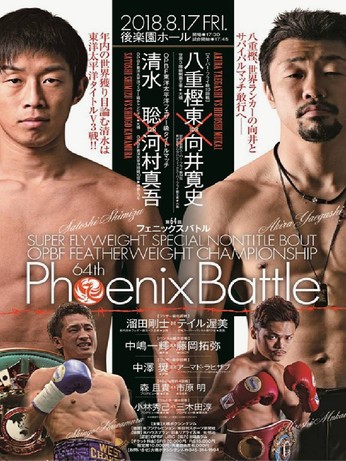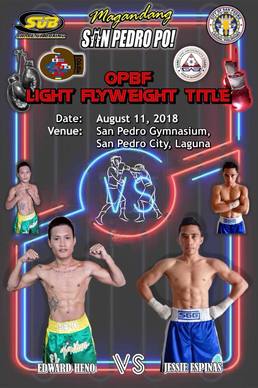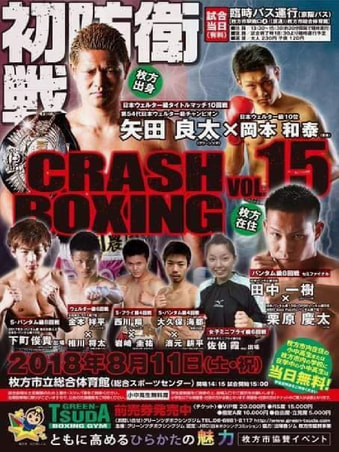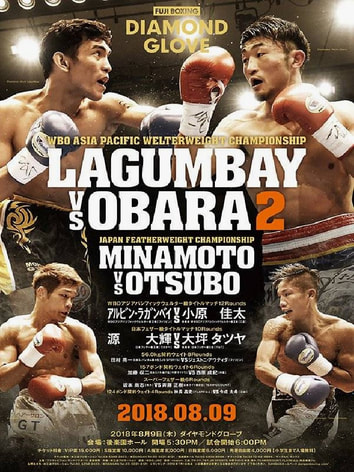 The Japanese Bantamweight title has, in 2018, been a cursed trinket. It was vacated in January by Ryo Akaho, who fell ill days before a scheduled defense. Following Akaho we then saw Yusuke Suzuki pull out of the bout for the then vacant title, due to injury, and Suguru Muranaka was forced to cancel a bout due to weight issues. Due to those issues we've gone with out a Japanese champion since Akaho vacated in January and over a year with out a Japanese title fight, with Akaho's August 2017 defense being the last time the title was on the line. Interestingly Akaho's that night was Yuta Saito (10-9-3, 7) who will be battling against Eita Kikuchi (21-5-4, 8) this coming Saturday for the vacant title. Whilst the title not being fought for in over a year is bad we actually need to go back over 2 years to find Saito's last win, which came in April 2016 against Corrales Kawashima. Since the win over Kawashima we've seen Saito go 0-2-1, fighting to a draw with Tatsuya Takahashi and losing to Akaho and Naoya Okamoto. On paper Saito has no right to be in a title fight, he has won less than half of his career bouts, is without a win in well over 2 years, and has only scored 3 wins since the the start of 2013. Whilst he's better than that sort of form suggests, and he has pushed fighters like Yushi Tanaka, Keita Nakano, and Naoya Okamoto incredibly close. Yes he has been losing, but he's been losing close bouts, often away from home, by close decision above the Bantamweight limit. And given the way Akaho, Suzuki and Muranaka have failed to come in on weight Saito will be regarded as a safe fighter to mane weight and get in the ring. In the ring Saito has got nasty power at domestic level, but sometimes lacks the skills to make the most of it. With 7 of his 10 wins coming inside the distance it's clear he can hurt opponents. Sadly though he can be hurt himself, as Akaho showed, and he can be out boxed, as several have shown. Give a real chance to prepare he can be a nightmare, and he will know he needs to make a statement here, as this really could be his last chance. At 32 years old Kikuchi probably wouldn't have expected his shot at the belt, especially given that he hasn't fought since losing in a Japanese title eliminator to Yusuke Suzuki last October. Like Saito however he is seen as a dependable fighter, who will be in the ring and won't be missing weight. In some ways that is possibly the key to this bout from the JBC's perspective, “lets make sure this bout takes place”. At his best Kikuchi was a solid fighter, and has scored career wins over the likes of Hideo Sakamoto, Noldi Manakane, and challenged for the OPBF Super Bantamweight title, losing to Shingo Wake in 2013. Despite being solid Kikuchi has been stopped in 3 of his 5 defeats and with just 8 stoppages in 30 career bouts he is not much of a puncher himself. With his 33rd birthday coming in December he will be physically less of a fighter than the one who challenged Wake, and went in the later stages with Taiki Minamoto, but can still hold his own against solid domestic competition. We don't think anyone would claim these are the best Japanese fighters at Bantamweight, a division that has the likes of Naoya Inoue, his brother Takuma Inoue or the exciting Hiroaki Teshigawara but they are in a position to fight for the national title and both will do everything they can to win. With that in mind we're expecting a brilliant fight, and we expect to see both men put it on the line, With his edge in power we favour Saito, but we wouldn't be surprised no matter who won. What we would be surprised by is for the winner to really have a long reign, as they will have fighters like Keita Kurihara snapping at their ankles for a shot, and it's hard to see either man defeating the contenders who will be lining up for a shot at the title in 2019.
0 Comments
 In Japan “Interim” national title fights aren't very common and are only really brought in when the champion is injured. This coming Friday we get one such a case, with Akinori Watanabe (36-7, 30) battling against Ryosuke Maruki (15-5-1, 10) due to an injury suffered by Nobuyuki Shindo, the Japanese Light Middleweight champion. In fact interestingly Shindo suffered the injury when he won the vacant title with a close decision win over Maruki at the Champion Carnival in May. For Watanabe this is a chance to add to his excellent career which has seen him claim Japanese and OPBF titles at Welterweight and a PABA title at Light Welterweight. It's also a chance to prove, at the age of 33, that the old dog still has plenty up his sleeve, despite recent losses to Magomed Kurbanov, Takeshi Inoue and Toshio Arikawa. For Maruki on the other hand the bout is a third shot a Japanese belt at 154lbs, having come up short in close bouts to Shindo and Yuki Nonaka. Sadly for Maruki he has got a reputation as a nearly man having also lost in the 2012 Rookie of the Year final, losing to Ryota Itoyama, and needing two cracks to win the WBC Youth Light Middleweight title. Watanabe has had a thrilling career. He would win his debut by decision before going on an incredible “stop or be stopped” run, that saw him going 17-3 (17). All 3 of those losses came in the first 3 rounds, including a 90 second loss to Tadashi Yuba in a Japanese Welterweight title fight, whilst 9 wins came in the opening round and all 17 in the first 8 rounds. Since then he has developed more than just his power, and has climbed a number of good wins, both by stoppage and by decision. Those have included a huge 2011 win over Yo Inoue for the Japanese and OPBF Welterweight titles, as well victories over Koshinmaru Saito, Prawet Singwancha and Kyung Suk Kwak . Watanabe had gone from 18-3 (17) to 33-4 (28) before losing in a Japanese title eliminator to Toshio Arikawa. That started a bit of a rot for Watanabe though a win this past April over Ratchasi Sithsaithong showed there was still some hunger there for Watanabe who will be wanting to make the most of this opportunity. Maruki's career has been explosive and exciting than Watanabe's but has been an interesting one with the 27 year old showing a lot of promise but just unable to get over the line when he needs to. He made his debut in 2010 and reached the Rookie of the Year final in 2012 before losing a close decision. He would suffer his second and third defeats in 2014, both of which were razor thin decisions. He would then lose Yuki Nonaka in 2016 and Shindo earlier this year, both in shots for the Japanese title. Despite losing his biggest bouts Maruki is an absolute handful. He's tough, strong, heavy handed and aggressive. His issues has often been pacing and tempo, starting too slowly and needing to do too much too late, and struggling to set the distance of the bout, with his best opponents often keeping him at range and preventing him from using his body shots up close. If he can set the pace early, get inside and work away he can cross the line and get the big, much needed career wins. We're expecting this, due to the styles of the two men, to be something very special. We're expecting both men to look for a fight, and throw power shots on the inside, there won't be a huge amount of feinting or technically impressive skills on show, but there will be a toe-to-toe war. For Maruki we think will be ideal, he's younger, naturally bigger and hungrier. Watanabe's power could be the difference, but we're thinking that Maruki will get it right, at least, and he'll finally pick up the big win.  This coming Friday fight fans at the Korakuen Hall will get a pretty interesting domestic title fight at 105lbs in a bout that neither man can really afford to lose. In one corner we will have 35 year old Japanese champion Shin Ono (22-9-3, 5), making his first defense of the title and looking to move towards one more world title shot. In the other corner will be 20 year old Riku Kano (13-3-1, 7), a once highly touted prospect who appears to be struggling no and has lost 2 of his last 5 bouts. Ono, from the esteemed Watanabe gym, has been a professional since 2001. His early career was pretty low key, with a couple of early career losses whilst moving to 8-2 (2). Sadly though after those first 10 bouts Ono took a 3 year break from the ring, not fighting between January 2005 and February 2008. In 2008 however he returned, picking up a notable win over a then unbeaten Yu Kimura before being stopped by Masayuki Kuroda. The loss Kuroda began a real dip in form for Ono who went 1-2-2 in his following 5 fights. He quickly fell from 8-2 to 11-5-2 (2). It was then that Ono had one of the best runs of his career, defeating Xiong Zhao Zhong in an 8 round bout, taking a very controversial win over Omari Kimweri to gain the OPBF Light Flyweight title and working his way up to an IBF title fight with Katsunari Takayama. He lost to Takayama, but didn't shame himself, losing 115-111 on two cards and 117-109 on the other, with two knockdowns late costing him hard. He would then suffer a number of set backs, coming up short in Japanese title fights to Kenichi Horikawa, Tatsuya Fukuhara and Reiya Konishi as well as a world title fight with Wanheng Menayothin. With his career on the line Ono claimed the Japanese title earlier this year at the champion carnival, defeating Ryoki Hirai with a close unanimous decision. The win saw Ono really grit his teeth, fall back on his experience and fight like a man who knew couldn't afford a loss. He used a busy southpaw jab, managed to get in and work when he needed to and exposed all sorts of flaws with Hirai. Kano made his his professional debut as a boxing baby in 2013, as a fresh faced 16 year old. Due to Japanese licensing rules his first 7 fights all took place in Thailand and the Philippines, with teenager going 5-1-1 (3) in those bouts and claiming the WBA Asia Minimumweight title, with a win over Madit Sada. It wasn't until June 2015 that Kano would make his Japanese debut, and the following year he claimed the OPBF “interim” Minimumweight title, defeating Merlito Sabillo. Just months later Kano would get his biggest fight, facing off with Katsunari Takayama for the WBO world title. Sadly for Kano he wasn't strong enough, busier enough, experienced enough or powerful enough to over-come Takayama, who took a clear technical decision, and destroyed Kano's hopes of becoming the youngest ever Japanese world champion. Since the loss Takayama we've not really seen Kano look all that good. He's stopped a couple of limited Thai visitors, suffered a stoppage loss to Jerry Tomogdan in a regional title fight and struggled past domestic foe Naoya Hariguchi. In the ring Kano is a skilled boxer, he has nice speed and good movement. Sadly though he really does lack power, he's somewhat physically immature, being more of a boy than a man, has a pretty weak work rate and as shown in the bout with Tomogdan he really dislikes taking body shots. His lack of work rate and issues with tempo could be a major problem here. We'd love to see Kano click and put it all together, live up to the early potential he showed and become a world champion. Sadly though we don't see that happening any time soon and we don't see him really holding his own with Ono. Ono's activity and ability to create a fight up close and personal will be the key. The champion will cut the distance and work away at the body of Kano. We don't think will stop Kano, but we do think he'll out work him to a clear decision victory.  This coming Thursday Japanese fight fans at the Korakuen Hall will see 2012 Olympic Bronze medal winner Satoshi Shimizu (6-0, 6) make his third defense of the OPBF Featherweight title, as he takes on fellow Japanese southpaw Shingo Kawamura (16-3-1, 8). Interestingly this will be Shimizu's second professional bout against a domestic foe, with his last being a 109 second blow out win against Takuya Yamamoto in May 2017. Coming in to this there is a lot of expectation on the champion who not only rides high as an Olympic medal winner or as the OPBF champion but also as a man tipped for huge success and a fighter with a perfect record. He's also entering the bout as a world ranked fighter and someone who is on the fast track to a world title fight, and given he's now 32 he can ill afford a set back if he wishes to fight at the top level of the professional ranks. Despite being a top level amateur fighter Shimizu has a rather unique and unorthodox fighting style which sees him really rely on his freakish amateur traits. He's a 5'10” southpaw fighting at Featherweight, not many fighters at 126lbs have ever been his size and he uses his height and reach to get away with a pretty free swinging fighting style. Although he has got a jab he does seem much happier to go bombs away and look to head hunt with wide arching hooks at range. It's a style that doesn't look like it should be effective but it is, and he's looked totally dominant so far, having barely if ever lost a round since he made his professional debut in September 2016. Blessed with not only size but also freakish power, impressive stamina and the team at the Ohashi gym behind him Shimizyu is a real nightmare to fight against. Kawamura on the other hand has got the amateur pedigree, the world ranking, the regional title or the hype of Shimizu. Instead the 28 year old Osakan has got 6 years of professional experience behind him, the development of a hard career and the experience of needing to build himself up from the ground. He actually lost by stoppage on his debut in side the opening round, much like current world champion Sho Kimura, but has bounced back from that loss. He bounced hack so impressively that the following year he was the Rookie of the Year at Featherweight sadly for Kawamura his rise through the ranks was slowed in 2014 when he suffered a surprise loss to Thai visitor Attanon Kunlawong / Kongthara KKP. Despite a loss on the road in 2016, to Mike Tawatchai, we've seen a real surge of success from Kawamura over the last 24 months with 5 straight wins including a massive one over Tae Il Atsumi last December, slowing the Japanese based Korean's ascent to a title fight. With his experience and confidence it's clear that he will be coming into this bout riding a bit of a high and he appears to be wary of Shimizu's low guard and his own advantages. Saying that however this is a massive step up in class for the challenger who will be looking to negate the reach and size advantages of Shimizu to land his straight left hand. We know Shimizu is flawed, very flawed, but there is something about his awkward style that seems to leave opponents both dumb founded and on the canvas. We expect the same unorthodox approach to work well here and for him to stop Kawamura, who has been taken out inside the distance in 2 of his 3 losses. Kawamura might be confident going into the bout, and see it as a fun experience, but the reality is that this is a very different test to what he's used to.  The Light Flyweight division is arguable the best in the sport right now, with so much fantastic talent and so much depth. It may not have the allure of the Welterweight division, the Lightweight division, the Middleweight division or the Heavyweight division, but for hardcore fans it's a division with a lot of intrigue and interest right now. Below the world level there are a number of rising contenders, hopefuls and prospects. One of those is OPBF champion Edward Heno (12-0-5, 5) who looks to make his second defense this coming weekend. Heno's challenger will be fellow rising contender Jesse Espinas (19-2, 11), in what looks like another in a growing line of brilliant all-Filipino match ups. The champion won the title last September, stopping Seita Ogido in their second meeting, though he was very unlucky not to have won the belt May that year when he was judges to have been held to a draw against Ogido after a tabulation error originally had him announced as the winner. Prior to winning the title Heno's best win had been a stoppage over Chris Ganoza. Since winning the belt he successfully defended the belt once, defeating former world champion Merlito Sabillo. In the ring Heno is speedy yet hard hitting fight, who certainly hits a lot harder than his record suggests. At the age of 25 he's moving into his physical prime, and has filled out his frame into that of a powerful Light Flyweight, rather than a small one. His career began with 3 straight draws and he was 6-0-4 (1) but has really turned that around with 4 stoppages in his last 6 wins. That sort of form is impressive and he has shown he can step up to the plate, as he did in his win over Sabillo, and can perform on the road, as he did twice against Ogido. This however will be one more solid test for Heno, and if he wins he really will be deserving of a world title fight. Espinas made his debut at 19 years old and he won his first 3 bouts before being upset by Ronelle Ferreras. A second winning run saw Espinas reel off 8 wins before losing by stoppage in a very tough match up against the unbeaten and hard hitting Christian Araneta, also a rising Filipino prospect at Light Flyweight. Since that loss Espinas has gone 8-0 (4) scoring notable wins over the likes of Joey Canoy, Paipharob Kokietgym, Elias Joaquino and Lester Abutan. Those wins have have made Espinas a fixture in the world rankings, and he is moving his way towards a world title fight. Although somewhat unknown outside of Asia Espinas is an accurate straight punching fighter who is sharp with his shots, defensively aware and fights like a confident fighter with a lot of self belief. There is a bit of a “strong but basic” look to him at times but that's getting results and there is tools in his arsenal that he doesn't always show, because of how accurate and heavy handed he is. It also helps that he has a solid chin and good work rate, able to turn up the pace when he has his man hurt. We're expecting to see Espinas try and keep Heno at the end of his straight shots, sadly for Espinas we suspect the power, self belief and speed of Heno will be the difference and the champion will out box the challenger en route to a decision win. Espinas will certainly have moments, but we think the quality of Heno will be too much over the 12 round distance, and the champion will take up a close, but clear, decision win.  The Welterweight scene in Japan is one of the weakest domestic scenes in the country, with very little depth in the division. Despite the lack of depth there are interesting match ups to be made, such as the recent Japanese title fight that saw Ryota Yada (16-4, 13) defeat Toshio Arikawa. This coming Saturday will make his first defence of the title as he takes on Kazuyasu Okamoto (14-5, 4) in Hirakata. For Yada the bout sees him getting a home coming coming defense, as he returns to the city of his birth whilst Okamoto gets a surprise opportunity following a loss last time out to Vladimir Baez. The champion has has a bit of an up-and-down career, though is certainly in the form of his career with 4 solid wins coming into this bout, including a career defining win over Arikawa. Whilst the first two of those wins were relatively meaningless the last two have seen him over-come the teak tough Moon Hyon Yun and score the win over Arikawa. Those wins have seen him bounce back brilliantly from a painful defeat to under-rated Filipino Jayar Inson as he's got his career back on track. Those recent wins help shore up a record which does lack other wins of major note, with Yada's next best wins coming over Makoto Kawasaki and Yuta Maruoka. What is notable however about Yada's record is that he's turned a 3-3 start around to a 16-4 record by going 13-1 and really putting those early losses behind him. In the ring Yada is a rough around the edges boxer-puncher, or rather more a puncher-boxer. He's not smooth, he's not fluent and he's not the most relaxed fighter, but he does have surprising speed, very decent size and reach and when he gets his full weight behind a shot fighters at this level really feel it, as Arikawa did. He doesn't seem to cope with pressure well, and fighters who can get inside can give him real issues, and his chin isn't the most solid, but his heart isn't to be questioned and he had to dig deep against Arikawa. Okamoto first came to the attention of Japanese fight fans back in 2010, when he reached the All Japan Rookie of the Year final, losing in the final to the more experienced Tomoya Yamada. Following the to Yamada it seemed like Okamoto's career struggled a little, as he went 3-3 in his next 6 bouts, including losses to So Takenaka and a stoppage loss to Kazuya Murata. That bad run was then followed by Okamoto's best career run of 5 straight wins before Vladimir Baez stopped him in 8 rounds to secure himself a Japanese title fight at 140lbs. To date Okamoto has only fought twice as a fully fledged Welterweight, going 1-1 in those two bouts. He's pretty tall for a Light Welterweight, but he'll be shorter than Yada here and hasn't shown the power or durability to live with Yada. That however shouldn't take away from the fact that Okamoto likes to press the fight, force a bout to be fought up close and bring a lot of pressure. It gave him real moments against Baez and we expect to see him rush Yada as well, especially given that that was something that worked for Inson against Yada. Sadly for Okamoto we think his lack of power will be a major issue and Yada has the power to hurt him coming in. Okamoto could cause some problems for the champion but we expect to see Yada land clean too often and take him out in in the second half of the fight, after Okamoto's feet start to slow and begins to struggle to cut the distance.  The Super Flyweight division is one of the most talent laden division's in the sport today with fighters like Srisaket Sor Rungvisai, Jerwin Ancajas, Juan Francisco Estrada, Donnie Nietes and Kazuto Ioka all being among the notable names competing at 115lbs. Sadly the division is a bit of a top heavy one right now, with a lot of world level talent and not much really making their mark on the Japanese domestic scene. At the moment the Japanese national champion is veteran Hiroyuki Kudaka (26-17-2, 11), who claimed the title earlier this year when he over-came Go Onaga to claim his second professional title almost 8 years after he claimed the WBC International Silver Flyweight title. This coming Friday Kudaka looks to make his first defense of the Japanese Super Flyweight title as he takes on 26 year old southpaw challenger Takayuki Okumoto (20-8-3, 10) at the EDION Arena Osaka. Although Kudaka is a relatively limited champion he has long been a must watch fighter. Win or lose Kudaka is a fun to watch fighter and despite being 33 years old he is still a fighter gets involved in wars, is durable enough to go the distance and has the stamina to lets his hands go in every round. At his very best, around a decade ago, he was a very good fighter who gave hell to the likes of Denkaosan Kaovichit, Takefumi Sakata, Panomroonglek Kaiyanghadaogym, Tetsuya Hisada, Oleydong Sithsamerchai and Sonny Boy Jaro, taking several wins from the fighters in that group. Over the last few years however he has picked up more losses than wins, coming up short against the likes of Ryo Matsumoto, Omar Andres Narvaez, Takuya Kogawa, Mark John Yap and Takuma Inoue. The Osakan champion began his career back in 2002 when he was stopped inside a round. Since then however he has proven a tough nut with only Narvaez stopping him in the subsequent 44 bouts. He can be dropped, he can be hurt but his fighting heart is hard to break and he will always look to come forward and break down opponents, especially at this domestic level. He lacks the power to take them out with one shot, but will look to grind them down and secure the wins on the scorecards. He can do that at domestic level, but above Japanese level he does seem to lack the skills to match his desire. The challenger made his debut in 2007, as a 15 year old in Thailand. Despite winning his debut he would be stopped in his second bout, also in Thailand. He would then be out of the ring for close to 2 years before making his Japanese debut and would lose his first bout in Japan. Following that loss he would go on an 8 fight unbeaten run, going 7-0-1 whilst defeating novice Japanese and Thai opponents. That winning run would come to an end when Okumoto stepped up in class, losing back to back bouts to Myung Ho Lee and Kohei Kubo, then being held to a draw by Akiyoshi Kanazawa, who would go on to beat Okumuto in a rematch between the two men. Even a return to Thailand failed to help Okumoto rebuild his career momentum as Rusalee Samor stopped him in 2 rounds. Despite the struggles Okumoto continued his career and actually managed to reel off 6 straight wins, including victories over Shota Kawaguchi and Yuta Saito, before losing a close decision to Thailand's Komgrich Nantapetch, aka Eaktwan BTU Ruaviking. That loss to the Thai was a set back but it was one that Okumoto bounced back from with a pair of stoppage wins before a technical draw with Eranio Semillano slowed his rise once again. It was only a temporary slowdown however as his next fight would see him getting a Japanese title fight with Ryuichi Funai, who took a technical decision over Okumoto. In the ring Okumoto really doesn't do anything special. He's gritty and can make fights ugly, but really isn't that powerful, that strong or that quick. His flaws however should lead to a fun fight here with Kudaka pressing the action and forcing both men to unload shots up close. We suspect the flaws of Okumoto will be his downfall, and Kudaka will be too be experienced, too tough and too busy for the challenger, in what will be a fun and entertaining contest, but one that Kudaka comes out on top of.  By - George Delis (@Delisketo) On the undercard of the upcoming Obara x Lagumbay “Revenge Fight”, Taiki Minamoto defends his Japanese Featherweight championship against Tatsuya Otsubo. Taiki Minamoto (15-5/12 KOs) began his pro-career in 2011, just 2 weeks after turning 20. Unlike most fighters who face opponents with losing records, in order to gain experience in their early years, Minamoto’s road was different, a path that led to a few losses, including one to future world champion Masayuki Ito. However, these encounters only made him more determined to come back stronger and defeat well-versed boxers like Eita Kikuchi (14-3*) and Seizo Kono (14-5*), even earning an opportunity at the Japanese Super Bantamweight champion and future IBF world title holder Yukinori Oguni (14-1*), a match that went the distance. Since then, Minamoto is on a 5 fight winning streak, with wins over the likes of Ryota Kajiki (28-9*) and Dai Iwai (21-4*) as well as Takenori Ohashi (15-4*), who he TKOed in order to become the Japanese Featherweight champion for the first time. https://twitter.com/Delisketo/status/1024980999405547520 Tatsuya Otsubo (12-8/4 KOs) will be Minamoto’s inaugural title defense. Otsubo, despite struggling through out his 11-year career, has won all of his last 4 bouts, since resurfacing from his hiatus in 2015, including victories over Ryuto Araya (twice) and Indonesian champion Musa Andy Letding. It’s worth mentioning that Otsubo holds a win over Akihiko Katagiri, the man who knocked Minamoto out on his 9th pro fight. On paper, Minamoto is the favourite to leave Korakuen Hall with the strap, as he’s currently ranked the #1 featherweight in Japan and has bested better fighters than his opponent. On the other hand, Otsubo seems to have turned a new page of his career and has vastly improved over the course of these last 2 years, so it wouldn’t be unthinkable if he can pull off the upset once again, this time with the gold on the line. *Fighter’s record before the fight. |
Previews
Having canned the old "Full Schedule" of Asianboxing we have instead decided to concentrate more on the major bouts. This section, the "Preview" section will look at major bouts involving OPBF and national titles. Hopefully leading to a more informative style for, you the reader. Archives
October 2022
Categories
All
|
 RSS Feed
RSS Feed
